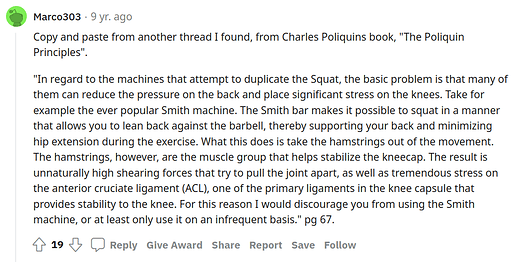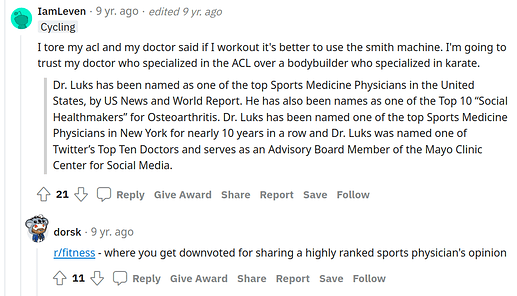Google “sports therapist” plus your city.
Nothing like being sick for a week to help me get down under 155 for the first time in five years.
That’s down almost 15 pounds from August after I was in my worst shape in years following knee surgery.
Been hitting the actual gym.
Going very slow and steady to try and repair the elbow and fix some fucked up movement patterns in my hip and foot.
Squats at 87.5kg
Bench at 77.5kg
Dumbell row at 21.8 kg
God damn I miss lifting heavy weights.
My knee hurts after squatting. Gonna repeat the same weight until I figure out what’s going on.
Regurgitating advice from Bro Rogan karate experts is like 99% of the fitness space. I checked and there’s basically no quality research supporting any of the common claims about Smith vs free weight squats that get parroted on forums and guru blogs. The top match on Google Scholar for “Smith machine squat” returns a paper whose authors actually wrote the following sentence:
After the study we determined the number of individuals required to reach statistical significance at alpha of 0.05 and power of 80%.
LOL yeah we know, but you aren’t supposed to say that part out loud because you’re just admitting to p-hacking when your paper is published for the other significant results that barely snuck into the Goldilocks range. I’m just going to assume this is the quality of research in these fields until shown otherwise, and as some more recent papers pointed out, the (limited) research on Smith vs. free are all over the place and often contradictory. If there was enough quality research to do a meta (there isn’t), it’s the pattern where I’d expect to find zero effect.
My best data point is that the biggest, strongest bro on 22 H&F switched to Smith when he was rehabbing something and then decided it was just as good and switched to Smith permanently (I think).
My thoughts are that if you can be one of the small percentage of people who is active enough to do some lifting and some cardio on a regular basis, plus eat pretty cleanly then the vast majority of H&F super specific stuff is just argyl bargle or dick measuring. Squatting, benching, or DLing a ton has very little marginal benefit for a normal person. Mostly a good way to get injured.
Lifting really heavy is BS
Fwiw I never liked the 2+2 H&F forum
The quality of studies in exercise science is notoriously terrible, from what I remember. You should honestly read them with an awareness that the conclusion of the study will be used to sell a product to some unwitting group of people. I wish I even knew who the most “trusted” sources for information are anymore. About the only exposure to studies I get anymore is from a facebook group with Lyle McDonald (Bodyrecomposition guy), where he is regularly picking apart and shitting on the studies that are posted in the group. He’s got his own issues with fitting the stereotype of “asshole that just tells the truth” in h is style of communication, so he has some real beef with a few dudes who have become popular over the years.
This Layne Norton guy seems pretty smart. But maybe not.
It may have come from 2+2. But his is the best fitness advice I’ve ever read.
- everything works
- some things work better than others
- nothing works forever.
Lifting heavy is one of the things that works better than others, but its absolutely not the only way, and it has its risks.
Regarding fitness science generally.
Theres a lot of junk here. And your average person is terrible at doing science or interpreting science.
On the other hand. I think theres an argument for the “artisan” view here. I.e. there can be professionals who know things through training and a lot of experience. That knowledge is valid despite the lack of science to back it up.
There are plenty of good people there. A lot of them mean well, but come off like yuuge jerks if you’re not used their sense of humor. Of course, there are actual jerks too.
Kind of depends on what you mean by normal person and a “a ton”. But if you’re just getting started and you’re in your 20s or 30s, building a program around that kind of stuff is gonna pay some dividends.
And even if you’re not lifting “a ton”, those compound lifts are great.
Doesn’t surprise me.
The H&F darlings are just personal trainers with blogs. Not scientists, not researchers, just personal trainers trying to maximize clicks and paying clients:
Right. As far as I’m concerned, there aren’t any trusted sources (see above). The thing I’m mostly interested in these days is obesity as a health and public policy issue, and there’s such a huge contrast in the quality of the two streams of research. Those jobs are gonna get a lot tougher for people who can’t legally prescribe Rybelsus and rely on selling you personal responsibility session packages for $599. The fitness / exercise / nutrition side gives off some strong chiropractic vibes.
You mean this guy?
I don’t know about that. Some certainly are, but few regs are actually paying for advice. Also I’d say one of the most respected sources for them is Stuart McGill, whose studies are also not great (also not abjectly terrible), but at least he makes a solid, good-faith effort. Maybe he has sold out too. I haven’t seen anything of his in a while.
Yikes. I knew he has an asshole but I wasn’t aware he was a racist asshole, despite the fact that those are often coupled. The reason I didn’t suspect racism is because the coaching client he posts about constantly (I’m like 90% sure they are a couple) is an Indian woman. Had to do some research and those quotes are from 2014 in the group I’m referring to on a post about leg extensions and those responses are still there.
I was going to quote this same phrase. It originates from Rippetoe and kyleb paraphrased it over on 2p2 land, I believe. How to Gain Velocity in the Long Run: Training Frustrations
I think I generally agree with @CS04 if we’re talking strictly from a physical fitness perspective. However, if we layer in psychological aspects of exercise & sport, just doing “some lifting and some cardio on a regular basis” isn’t a very motivating proposition. Though I’m sure there is more to that statement than I’m reading into it. Some people just don’t like exercise so seeing numbers go up regularly is very motivating and the joy of hitting a PR is something that keeps people coming back to the gym. PRs aren’t the only form of progress though, they are often just one of the easiest to measure.
The absolute most important thing for fitness ive found is programming training that you enjoy doing.
i just happen to fucking love the big compound lifts so thats what i do.
regarding compound barbell lifts my take is basically this:
- most people don’t like doing them because not only are they quite hard to master form wise, they are extremely intense/demanding from both a physical and mental perspective.
- almost always if you are getting injured, or to a lesser extent feeling pain doing compound lifts its likely your fault and not the lifts fault (bad form, ego lifting, bad nutrition, bad sleep).
If you don’t enjoy them don’t do them. However learning to do them properly will, in my opinion, help in every other aspect of fitness even if you don’t want incorporate them permanently into your programming.
Regarding lifting heavy: Increasing the weight isn’t the only type of progression, you can increase reps, you can increase time under tension, decrease rest between sets etc to achieve progressive overload. There’s a super wide range to achieve muscle growth in terms of reps / sets you can do.
if you dont already check out the huberman lab podcast, there’s a wealth of peer reviewed/science backed health/fitness/wellbeing protocols discussed that you can pick and choose from to build up your routines in and out of the gym.
The most important fitness thing I’ve discovered over the past couple years is the extent to which diet and nutrition matter. Not even like “ingest tons of protein to build muscle.” It’s more like if you simply eliminate junk and just eat healthy foods, strength gains and weight loss come relatively easy.
Based on this conversation some of you might really like (or maybe not) that podcast I linked with Layne Norton. I feel like I got a lot out of it anyway. That Drive podcast with Peter Attia is incredible.
I haven’t finished the second Layne Norton appearance yet. But let’s see if I can summarize:
- Muscle mass and strength are pretty much the same thing when it comes to long term health into old age.
- The best way to gain, for people past beginner stage but not super-advanced, can be something like adding more sets of RPE 5-7 (meaning you could do 3-5 more reps before failure) - versus adding more weight at super low reps, or more reps.
- You don’t need to put in as much intensity with compound lifts to get the same gains as isolated lifts.
Did you see the video where he fucks his dogs?


